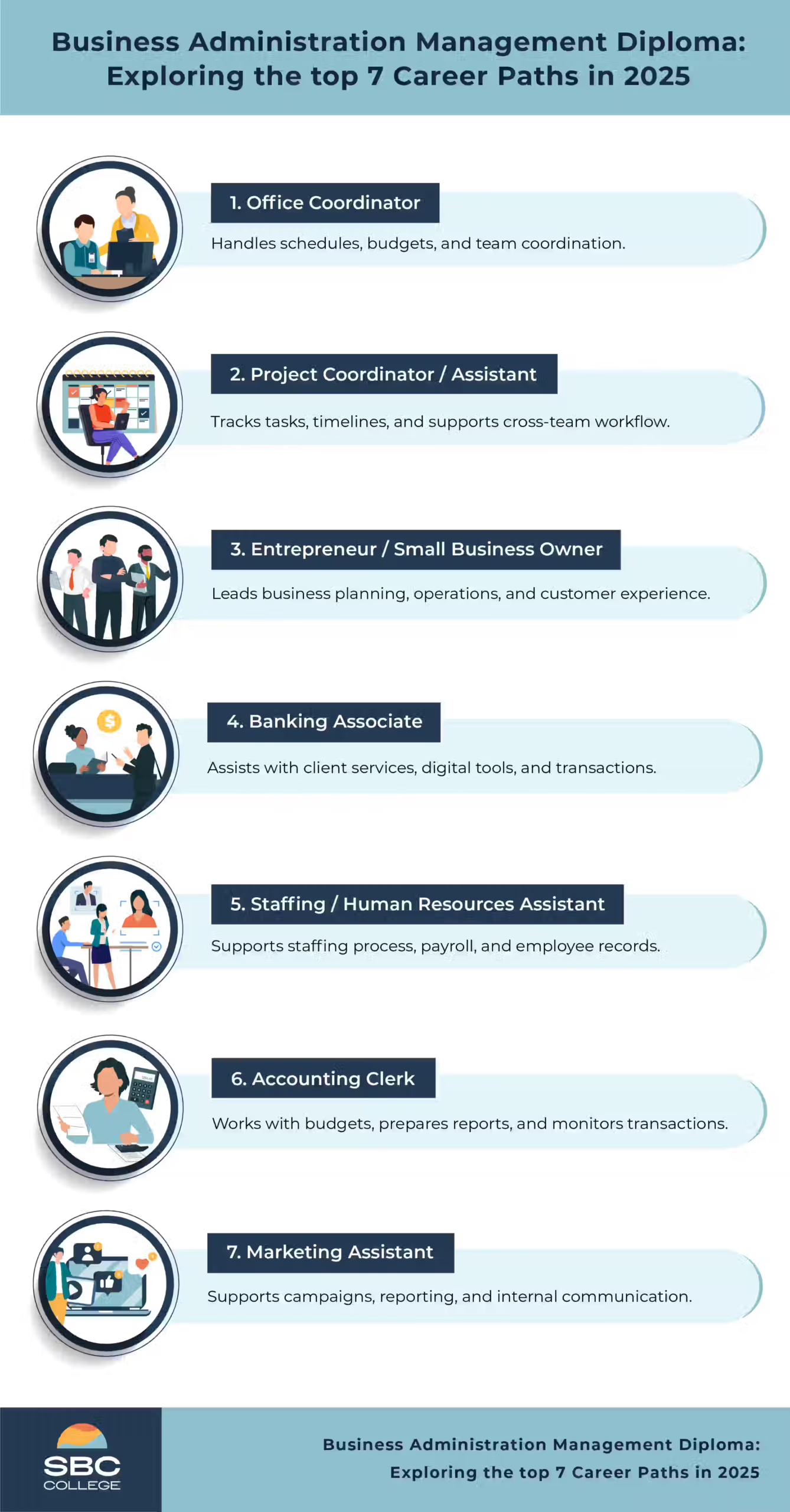Table of Contents
Every workplace needs skilled professionals who can manage budgets, organize schedules, prepare reports, support hiring, and lead teams. That’s where the Business Administration Management Diploma comes in. This program prepares you for various entry-level roles that influence how offices operate, how teams collaborate, and how decisions get made.
The job roles below show how this training builds practical skills and leads to career opportunities across a variety of workplaces.
Listen to: Business Administration Management Diploma: Exploring the Top 7 Career Paths in 2025
1. Office Coordinator
Imagine managing the day-to-day operations of a busy office. As an office coordinator, you’ll help with schedules, records, budgets, and document preparation. Your work is essential to supporting teams in private clinics, non-profits, and businesses.
In a smaller office, you might also help with staffing and be the main point of contact for employees or clients when questions come up. Over time, and with experience, you can grow into roles that involve team oversight.
This role could be a good fit if you’ve been trained in office management procedures, budgeting, and team supervision. It also helps to be comfortable using Microsoft Office, accounting software, and workplace communication tools.
2. Project Coordinator/Assistant
Do you tend to get involved when tasks need direction or follow-up?
As a project coordinator or assistant, that instinct becomes part of your day. You create schedules, check progress, and remind team members what’s due and when. When plans shift, you help update the timeline and guide the team through the changes.
You might support a marketing team, healthcare office, construction crew, or tech project. In each case, you help people stay focused on the task at hand.
To take on these responsibilities, you’ll need to know how to plan meetings, prepare project documents, and communicate with different teams. Familiarity with tools like Word and Excel also supports daily planning, reporting, and task management.
3. Entrepreneur/Small Business Owner
Got a business idea you can’t stop thinking about?
Being an entrepreneur means turning that idea into something others can use, visit, or benefit from. You might open a café, run a retail store, offer consulting services, or launch a start-up from your own home.
You manage it all—budgeting, staffing, daily operations, and creating a positive experience for your customers. Every decision has an impact, so planning and knowing your numbers matter from day one.
As Andrew C., a course instructor in the Business Administration Management Program, puts it: “Entrepreneurs wear a lot of hats. You need to understand your cash flow, set up systems for daily operations, and make decisions that affect both customers and staff. A strong business model and clear planning process are what keep the business stable over time.”
Training in areas like business management, budgeting, marketing, and planning can help you make informed decisions and build sustainable business from the start.
4. Banking Associate
You might go to the bank to cash a cheque or ask a question. Have you ever thought about working there instead?
As a banking associate, you’re the person customers turn to for everyday help—opening accounts, making transactions, and figuring out how to use online or mobile banking. You may suggest services based on an individual’s needs, like starting a savings plan or managing credit.
These roles are based in bank branches, credit unions, or financial centres. Your typical day involves a mix of client support and office work—updating records, checking on applications, and helping with reports and checklists.
To succeed in this role, you need to be comfortable with numbers, confident using digital tools, and have good communication skills. Knowing how interest, savings, and credit work also helps when you’re explaining products or handling transactions for clients.
5. Staffing /Human Resources Assistant
If you see yourself helping workplaces stay staffed, organized, and compliant, starting as a human resources assistant could be a practical entry point. You’ll help coordinate work schedules, manage employee records, and support the processes that impact employment relationships. This can include scheduling interviews, preparing documentation, and supporting both hiring and exit procedures.
Curline L., an instructor in the Business Administration Management Program at SBC College, explains: “Staffing professionals take part in key aspects of the employment relationship. They may review contracts, define job terms, and handle exits in a way that aligns with current laws and internal policies.”
You could find opportunities in corporate offices, small businesses, or non-profit settings, where employee support and accurate documentation are essential.
To prepare for this type of role, you’ll need training in staffing procedures, employment contracts, and guiding employee relations. It also calls for professional communication, good judgment, and attention to detail, especially when handling confidential information and supporting both staff and management.
6. Accounting Clerk
Interested in how organizations track spending, process payments, and keep accurate records? As an accounting clerk, you’ll play a key role in organizing day-to-day financial activities. You might process invoices, track accounts receivable and payable, or help reconcile transactions at the end of the month.
Your responsibilities could also include preparing basic reports, reviewing budgets, or updating files using accounting systems. In some workplaces, you may answer client billing questions or support the team with administrative tasks like document filing or ordering supplies.
This role is a great starting point if you’ve been trained in bookkeeping, budgeting, or financial reporting. Employers often look for candidates who are familiar with spreadsheets, accounting software, and office procedures – all of which you’ll learn in a Business Administration diploma program.
7. Marketing Assistant

How about playing a role in making marketing campaigns happen? As a marketing assistant, you’ll support the team with day-to-day coordination and administrative tasks. One day, you might gather market data or prepare a summary report. The next, you could be updating materials, organizing files, or helping set up content across print, web, or social media.
You work closely with people across departments to coordinate materials, meet deadlines, and keep brand messaging aligned with campaign goals.
Janice T., a marketing instructor in the Business Administration Management Program at SBC College, points out: “Marketing assistants are often the link between planning and execution. Whether it’s supporting a product launch or preparing internal content, their work depends on clear communication and a strong grasp of what the audience and the team need.”
This role is a good fit if you’ve been trained in business or marketing, enjoy working with both people and ideas, and want to be involved in how campaigns are coordinated across teams.

Is a Business Administration Management Diploma Right for you?
If you’re interested in career paths that involve planning, coordination, and strategic decision-making, the Business Administration Management Diploma Program provides a solid foundation. Whether your aspirations include managing office operations, overseeing financial reporting, guiding staffing processes, or launching your own business, the skills you develop now will influence your future trajectory.
SBC’s Business Administration Management Diploma offers training in budgeting, marketing, supervision, and sales management. The program emphasizes practical learning, helping you become proficient with tools and systems commonly used in today’s workplaces. This includes Microsoft Outlook, Word, and Excel while developing skills in budgeting, document preparation, office procedures, and business planning.
With a curriculum built around current workplace needs and a practicum option available, the program supports a quicker transition into the workforce.
To learn more, contact an admissions advisor and explore where this diploma can take you.
Frequently Asked Questions (FAQs):
What is business administration?
Business administration focuses on how work gets done within an organization. It involves managing budgets, overseeing schedules, preparing reports, coordinating staff, and supporting internal communication. Administrators help departments stay organized, make use of data, and follow procedures that keep business objectives in focus.
What skills are most in-demand for these careers?
Skills that are highly valued in business administration roles include:
- Budgeting and financial literacy
- Communication and report writing
- Microsoft Office (Word, Excel, Outlook)
- Team coordination and scheduling
- Document preparation and record keeping
- Strategic thinking and decision-making
- Time management and customer service
SBC’s Business Administration Management program develops these in-demand skills through hands-on courses like Business Essentials, Communications and Interpersonal Skills, Supervision, Financial Planning, and Marketing.
Does SBC offer career placement assistance?
Yes. All SBC diploma programs include Career Strategies, a course designed to help you prepare for the workforce. Through resume writing, mock interviews, and job search techniques, you’ll build the skills needed to apply for roles after graduation.
What are the prerequisites for the Business Administration Management diploma?
You must meet one of the following:
- Grade 12 with a minimum 65% average
- GED 12 in the 53rd percentile or higher
- Mature Student Admissions
These program prerequisites make sure that you are ready to succeed in the coursework and practical training ahead.
How long is the Business Administration diploma program?
The length of the program is 43 weeks.






